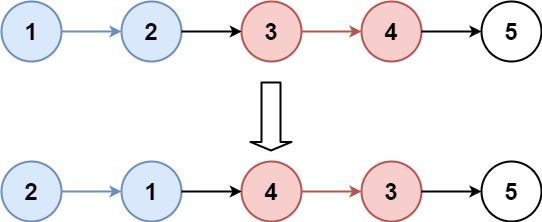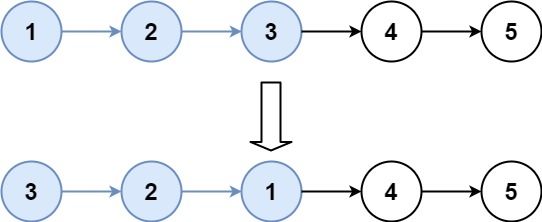Given a linked list, reverse the nodes of a linked list k at a time and return its modified list.
k is a positive integer and is less than or equal to the length of the linked list. If the number of nodes is not a multiple of k then left-out nodes, in the end, should remain as it is.
Follow up:
- Could you solve the problem in
O(1)extra memory space? - You may not alter the values in the list's nodes, only nodes itself may be changed.
Example 1:
Input: head = [1,2,3,4,5], k = 2 Output: [2,1,4,3,5]
Example 2:
Input: head = [1,2,3,4,5], k = 3 Output: [3,2,1,4,5]
Example 3:
Input: head = [1,2,3,4,5], k = 1 Output: [1,2,3,4,5]
Example 4:
Input: head = [1], k = 1 Output: [1]
Constraints:
- The number of nodes in the list is in the range
sz. 1 <= sz <= 50000 <= Node.val <= 10001 <= k <= sz
# Definition for singly-linked list.
# class ListNode:
# def __init__(self, val=0, next=None):
# self.val = val
# self.next = next
class Solution:
def reverseKGroup(self, head: ListNode, k: int) -> ListNode:
def reverseList(head):
pre, p = None, head
while p:
q = p.next
p.next = pre
pre = p
p = q
return pre
dummy = ListNode(next=head)
pre = cur = dummy
while cur.next:
for _ in range(k):
cur = cur.next
if cur is None:
return dummy.next
t = cur.next
cur.next = None
start = pre.next
pre.next = reverseList(start)
start.next = t
pre = start
cur = pre
return dummy.next/**
* Definition for singly-linked list.
* public class ListNode {
* int val;
* ListNode next;
* ListNode() {}
* ListNode(int val) { this.val = val; }
* ListNode(int val, ListNode next) { this.val = val; this.next = next; }
* }
*/
class Solution {
public ListNode reverseKGroup(ListNode head, int k) {
ListNode dummy = new ListNode(0, head);
ListNode pre = dummy, cur = dummy;
while (cur.next != null) {
for (int i = 0; i < k && cur != null; ++i) {
cur = cur.next;
}
if (cur == null) {
return dummy.next;
}
ListNode t = cur.next;
cur.next = null;
ListNode start = pre.next;
pre.next = reverseList(start);
start.next = t;
pre = start;
cur = pre;
}
return dummy.next;
}
private ListNode reverseList(ListNode head) {
ListNode pre = null, p = head;
while (p != null) {
ListNode q = p.next;
p.next = pre;
pre = p;
p = q;
}
return pre;
}
}/**
* Definition for singly-linked list.
* class ListNode {
* val: number
* next: ListNode | null
* constructor(val?: number, next?: ListNode | null) {
* this.val = (val===undefined ? 0 : val)
* this.next = (next===undefined ? null : next)
* }
* }
*/
function reverseKGroup(head: ListNode | null, k: number): ListNode | null {
let dummy = new ListNode(0, head);
let pre = dummy;
// pre->head-> ... ->tail-> next
while (head != null) {
let tail = pre;
for (let i=0; i<k; ++i) {
tail = tail.next;
if (tail == null) {
return dummy.next;
}
}
let t = tail.next;
[head, tail] = reverse(head, tail);
// set next
pre.next = head;
tail.next = t;
// set new pre and new head
pre = tail;
head = t;
}
return dummy.next;
};
function reverse (head: ListNode, tail: ListNode) {
let cur = head;
let pre = tail.next;
// head -> next -> ... -> tail -> pre
while (pre != tail) {
let t = cur.next;
cur.next = pre;
pre = cur;
cur = t;
}
return [tail, head]
}/**
* Definition for singly-linked list.
* type ListNode struct {
* Val int
* Next *ListNode
* }
*/
func reverseKGroup(head *ListNode, k int) *ListNode {
dummy := &ListNode{0, head}
pre := dummy
cur := dummy
for cur.Next != nil {
for i := 0; i < k && cur != nil; i++ {
cur = cur.Next
}
if cur == nil {
return dummy.Next
}
t := cur.Next
cur.Next = nil
start := pre.Next
pre.Next = reverseList(start)
start.Next = t
pre = start
cur = pre
}
return dummy.Next
}
func reverseList(head *ListNode) *ListNode {
if head == nil ||head.Next == nil {
return head
}
dummyHead := &ListNode{}
cur := head
for cur != nil {
tmp := cur.Next
cur.Next = dummyHead.Next
dummyHead.Next = cur
cur = tmp
}
return dummyHead.Next
}/**
* Definition for singly-linked list.
* public class ListNode {
* public int val;
* public ListNode next;
* public ListNode(int val=0, ListNode next=null) {
* this.val = val;
* this.next = next;
* }
* }
*/
public class Solution {
public ListNode ReverseKGroup(ListNode head, int k) {
ListNode dummy = new ListNode(0, head);
ListNode pre = dummy, cur = dummy;
while (cur.next != null)
{
for (int i = 0; i < k && cur != null; ++i)
{
cur = cur.next;
}
if (cur == null)
{
return dummy.next;
}
ListNode t = cur.next;
cur.next = null;
ListNode start = pre.next;
pre.next = ReverseList(start);
start.next = t;
pre = start;
cur = pre;
}
return dummy.next;
}
private ListNode ReverseList(ListNode head) {
ListNode pre = null, p = head;
while (p != null)
{
ListNode q = p.next;
p.next = pre;
pre = p;
p = q;
}
return pre;
}
}

